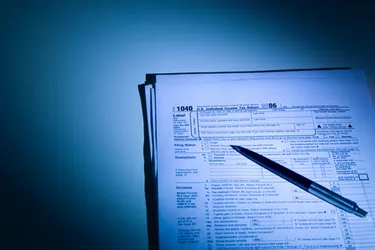
The Internal Revenue Service places unpaid past tax obligations at the highest priority. Such obligations will have a priority over current refunds. If you owe back taxes, you should expect the IRS to deduct them from any current or future refunds, until the obligations are paid in full. In addition, the IRS will remove other federal obligations that are in arrears from your refunds, including defaulted student loans and child support.
Past Due IRS Tax Obligation
Video of the Day
Back taxes are any amount that you still owe the IRS for income tax assessments in previous tax years. These may have been incurred due to underpayment of taxes. If you did not file a return, the IRS may have filed a substitute return on your behalf. The IRS can also asses penalties and interest from the due date that will increase the amount of tax due.
Video of the Day
It is never a good idea to ignore a tax obligation. Once a tax obligation has been assessed on you by the IRS, they will begin a collection process that may include include a levy on your wages or bank accounts or a federal tax lien against your personal property.
Consider Also: Who Must File Income Taxes?
Understanding Tax Refunds
A tax refund is a payment from the IRS to a taxpayer due to overpayment of taxes or through the benefit of tax credits and stimulus payments. With every paycheck you receive, the IRS will deduct a portion of your income. At the end of the year when you file your taxes, you will be able to calculate the tax due and determine if an overpayment or the sum of credits entitle you to a refund. Regardless of whether you owe back taxes, it is always wise to claim tax refunds from the IRS at the earliest possible date.
Consider Also: Where's My Tax Refund: An Easy Guide
Deducting Obligations From Refund
The IRS refers in Publication 17 to an "Offset against debts." If you determine that you are due a refund but you still owe unpaid back taxes, the IRS clearly states that they may confiscate the refund to pay some or all of the debt you owe. This policy covers all past-due federal income tax, including back taxes you pay monthly on an installment agreement.
The reduction of your refund also includes other federal debt obligations such as student loans, or state income taxes due as well as child and spousal support obligations. The IRS will notify you if a refund you claim is offset against any of your debts.
Consider Also: What Happens If You Can't Make Federal Tax Payments?
An Injured Spouse
In situations where a joint return is filed but only one spouse owes a past-due amount, the IRS may classify the other spouse as what they call an injured spouse. The IRS requires an injured spouse to file Form 8379, "Injured Spouse Allocation." There are two qualifications for an injured spouse to receive a refund of an overpayment shown on a joint return.
First, you must not be legally obligated to pay the past-due amount in question. Secondly, an injured spouse must have made and reported tax payments, including federal income tax withheld from your wages, or you must be able to claim a refundable tax credit.